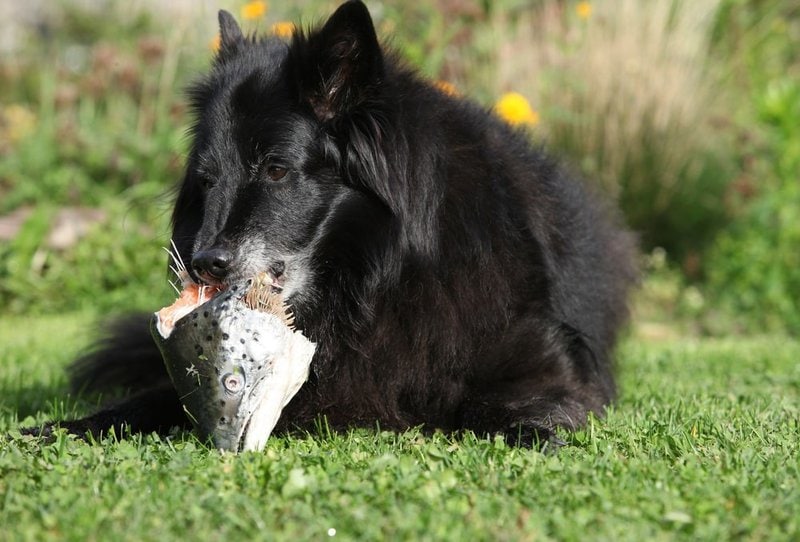Proteins are easily the most important part of any dog’s diet. Most dog food brands focus on sources like beef, chicken, turkey, and lamb. However, it is nice to switch things up for your dog and introduce cleaner protein sources like fish.
Dogs can certainly have fish. Fish in a dog’s diet provides an incredible source of omega oils and other essential nutrients, all of which offer a number of health benefits like improved coat health.
In the sections below, we shall take a look at more health and nutritional benefits of fish as well as the risks of giving your pooch too much.
Can Dogs Have Fish?
Not only can dogs have fish but it is also highly advisable to include it in their diet as a regular fixture. This is because of the numerous health and general benefits of fish to your pooch.
For the most part, these health benefits are directly linked to the rich nutritional profile that fish offers to a meal. Here is a bit more on these perks for a better perspective on what you are signing your dog up for.
Good Source Of Omega Oils
Perhaps the biggest health benefit that fish has over other meats in a dog’s diet is its richness in omega oils. These include omega-3 and omega-6 oils.
Both of these essential fatty acids have numerous health benefits to the dogs with the most notable being improved coat health and appearance.
These oils are also useful in brain development and promoting cognitive functionality. They are thus great for puppies and pregnant doggies.
Rich In Protein
Dogs are carnivores and need a protein-heavy diet. Fish is pretty much mostly protein and therefore fits right in with the pooch’s health needs.
Organically sourced and freshly prepared fish in particular is rich in all the amino acids that your dog needs to build both structural and functional proteins. The best part is that they are low in unhealthy fats like bad cholesterol.
Rich In Minerals
Minerals are a crucial part of the dog’s diet for a number of reasons. They are used pretty much everywhere in the body from calcium in the bone to potassium in the clotting process.
Fish meat offers most of these crucial minerals. They include iron, zinc, iodine, magnesium, and potassium.
Great Flavor
If your dog is a picky eater, introducing fish to their diet would be a great way to switch things up and get them excited about food again.
Whether preserved, boiled, steamed, air-fried, or baked, fish will always offer a great flavor profile that not even the pickiest of doggies will be able to resist.
Easy To Digest
When cooked, fish is less dense and has fewer saturated fats than red meat sources. This makes it easier to digest for the doggy. The ease of digestion will come in very handy if your dog is suffering from long-term digestive issues or acute irritation.
Great Hypoallergenic Alternative
Fish rarely causes allergic reactions in dogs. It can therefore serve as a fantastic alternative for dogs with allergies to more commonly used meats in dog food like beef or chicken.
However, it is important to remember that some dogs can actually be allergic to fish and other seafood. You should therefore ensure that you get your dog tested before making this switch.
What Types Of Fish Can Dogs Eat?

Dogs can eat pretty much any type of fish that isn’t known to be a common reservoir for heavy metals like lead. The fish should also ideally be organically raised and ethically harvested.
Here are a few of the best types of fish to give to your dog.
Can I Feed My Dog Fish Every Day?
It is not a good idea to feed your dog fish every day or have your dog take up a pescatarian diet.
This is because the dog will most likely get tired of the monotony of the flavors and end up rejecting what is otherwise a healthy protein source.
In addition, some fish are full of toxins like mercury as well as products used in fish farming. By feeding your dog fish every day, you increase their exposure to these often toxic compounds.
Moderation is key when it comes to including fish in your dog’s diet. Ideally, you should only feed your dog fish once or twice a week, and your dog should not become a pescatarian thereafter.
The amount of fish depends on the type of fish, the dog breed, the dog’s age, and the activity levels of the dog.
However, you can follow the same serving suggestions you will use for other meats like chicken depending on your dog’s age and activity levels.
What Fish Can Dogs Not Eat?
Dogs should never be fed fish like sharks, king mackerel, swordfish, and canned albacore tuna. These are all identified as being full of toxic substances like mercury that they get from their contaminated natural habitats.
When your dog consumes these fish, they are likely to develop mercury poisoning. The effects of mercury on your dog are slow and usually very vague and include weight loss, poor coat health, reduced energy levels, and eventually, features of kidney failure.
Another group of fish that should be avoided when it comes to feeding dogs is farm-raised fish. This is because their rearing often includes the addition of antibiotics, hormones, and dyes to their diet to make them large and appealing to the market.
These additives will be consumed by your dog and will cause negative effects on their health in the long run. Some of the worst of these consequences can include antibiotic resistance and an increased risk of developing cancer.

Can Dogs Eat Raw Fish?
Dogs should never eat raw fish of any kind. Even if you get your hands on sushi-grade fish, it is best to play it safe and just feed your dog with cooked fish.
Here are two main reasons why raw fish is never a good idea for dogs.
Parasite Infestation
Fish frequently harbor all sorts of parasites including fish tapeworms, flukes, and roundworms. One of the most notorious of these is the Neorickettsia helminthoeca found in salmon and responsible for what is referred to as salmon poisoning.
The parasites could cause a number of issues depending on where they settle.
Those that typically settle within the muscle will cause muscle aches for the dog which could manifest as limping and generally reduced energy and activity levels. You may also notice muscle wasting in your affected dog.
Other parasites from fish do most of their damage to the dog’s digestive tract. These include tapeworms that pretty much set up shop in the dog’s gut and consume most of the food that your dog takes. Here are some of the signs and symptoms of parasitic infestation.
- Failure to thrive or weight loss
- Poor coat appearance
- Abdominal distention despite weight loss
- Frequent bouts of either diarrhea, constipation, or both
- Blood in stool or urine
- Live worms or eggs in the dog’s feces or perianal region
Bacterial Food Poisoning
Raw fish also harbors harmful bacteria including strains of Listeria, Vibrio, Clostridium, and Salmonella. These typically cause food poisoning in the dog which may become evident faster than parasite infestation.
Some of the signs and symptoms of food poisoning in your dog from raw fish include:
- Diarrhea with or without blood
- Abdominal pain
- Vomiting
- Dehydration
- Reduced appetite





